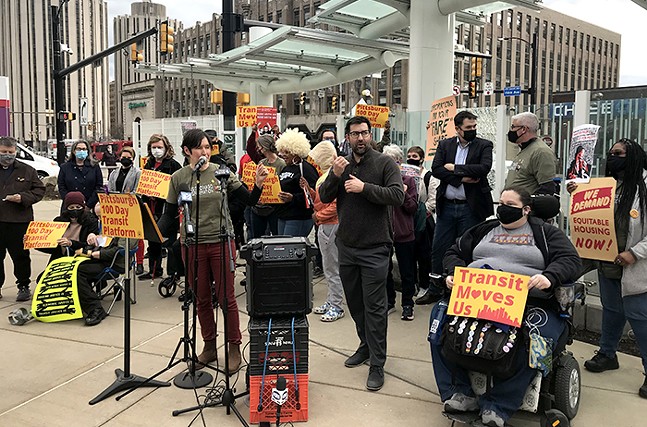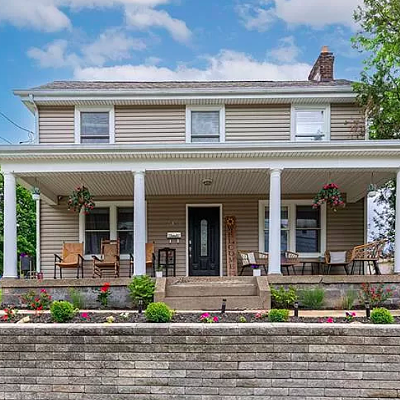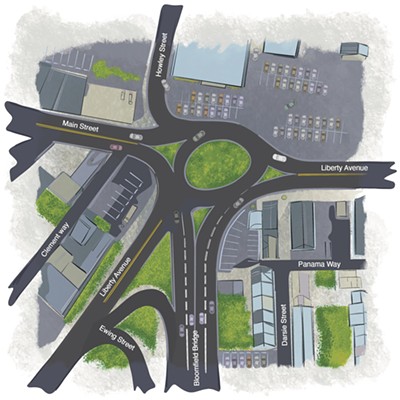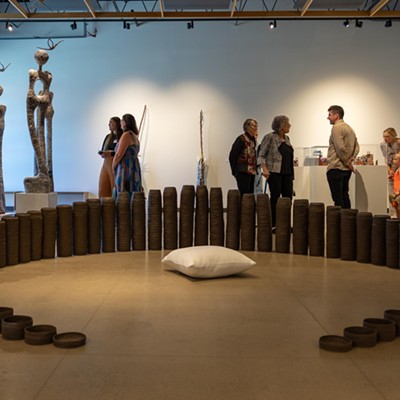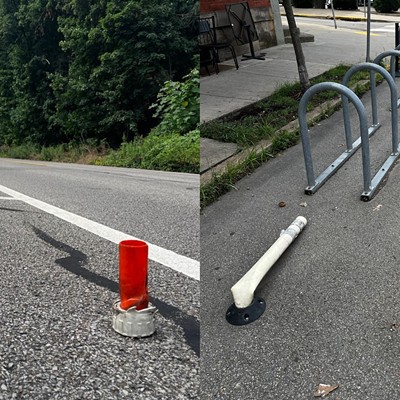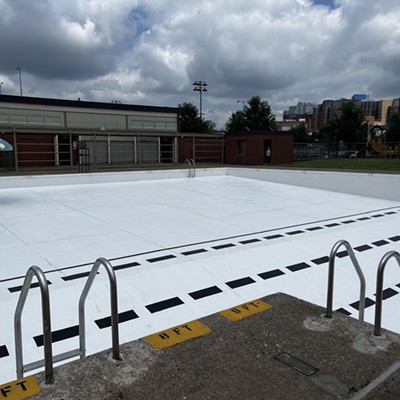Advocates unveil Pittsburgh city transit platform to improve sidewalks, development, and more
[
{
"name": "Local Action Unit",
"component": "24929589",
"insertPoint": "3",
"requiredCountToDisplay": "1"
}
]
On Dec. 16, more than two dozen advocates held a rally near a bus stop in Pittsburgh’s Oakland neighborhood and unveiled a transit platform that they hope the city will implement within the first 100 days of Pittsburgh Mayor-elect Ed Gainey’s administration, which will begin in the new year.
The rally was hosted by Pittsburghers for Public Transit, who released its Pittsburgh 100 Days Transit Platform, which outlines what city officials can do to ensure public transit succeeds and grows in the region.
The Pittsburgh 100 Days Transit Platform includes 18 different requests for city government to implement at the start of 2022. Some include a plan to provide transit passes for city employees and residents of city-supported homeless shelters, making sidewalk accessibility a citywide priority, relocating the more than 20 bus shelters in the city that no longer serve as bus stops, and budgeting for snow removal of city-owned sidewalks and curb cuts.
Zoning changes are also a large part of the 100 days platform. PPT director Laura Wiens said zoning is integral to ensure that the right type of housing is built near high-quality transit. She said the East Busway can’t be moved, but the city can plan for affordable and dense development with amenities to be near it. She said this can help Pittsburghers live without needing a private vehicle.
The platform calls for minimizing or eliminating parking minimums, and for higher levels of density and affordability within walking distance of frequent transit routes, as well as restarting the ForgingPGH land-use planning process.
Wiens reminded the crowd that Pittsburgh is actually a well-performing city in terms of public transit usage, but said she believes it can be better. Wiens noted that the Port Authority of Allegheny County runs public transit in the region and that the agency is largely separate from city government, However, she pointed out that city government is also responsible for aspects related to transit that can improve ridership and the public-transit experience.
Wiens said the city needs to invest more in making sidewalks and bus stops accessible and high-quality. About 23% of city residents don’t have access to a private vehicle, and Wiens said improvements to infrastructure and housing around transit stops is necessary to better serve this population.
She added that the city can change zoning to better work with transit, and that the county government and Port Authority can’t make those changes without cooperation from the city.
The 100 Days Transit Platform has already received considerable support among Pittsburgh City Councilors. Four out of the nine councilors have already offered their backing to the platform — Anthony Coghill, Deb Gross, Erika Strassburger, and Bobby Wilson.
Gross spoke at the rally and supported allocating city resources for hiring more staff to the city’s Department of Mobility and Infrastructure to implement the platform.
She also lobbied for zoning changes that would boost transit ridership and said that inclusionary zoning — where developers are required to include percentages of permanently affordable housing in projects — should be included in those zoning changes. Gross noted a 10% inclusionary zoning policy would be ideal, like what the city currently requires for development in Lawrenceville.
“As a city, we value affordable housing, equity, and accessibility, but we have not aligned our actions with our values,” said Gross in a press release. “I support Pittsburghers for Public Transit’s proposals like building affordable housing near major transportation routes because it is a clear, actionable policy and it will help us build a stronger city.”
Bill McDowell, a disability rights activist who uses crutches, stressed the importance of sidewalk maintenance and curb-cuts to help residents access public transit. He said at the rally that it's the city’s responsibility to keep sidewalks and bus stops in a good condition and that he wants to see the city put more energy into that effort.
Mayor-elect Gainey says that he will be reviewing these recommendations, and will be building “a plan for local and regional transportation systems that meet the needs of every Pittsburgher.”
"I want to thank the members of PPT for preparing these recommendations for the future of transportation policy in Pittsburgh, and I look forward to working with them as we build the infrastructure to make Pittsburgh a city for all,” said Gainey in a statement.
The rally was hosted by Pittsburghers for Public Transit, who released its Pittsburgh 100 Days Transit Platform, which outlines what city officials can do to ensure public transit succeeds and grows in the region.
The Pittsburgh 100 Days Transit Platform includes 18 different requests for city government to implement at the start of 2022. Some include a plan to provide transit passes for city employees and residents of city-supported homeless shelters, making sidewalk accessibility a citywide priority, relocating the more than 20 bus shelters in the city that no longer serve as bus stops, and budgeting for snow removal of city-owned sidewalks and curb cuts.
Zoning changes are also a large part of the 100 days platform. PPT director Laura Wiens said zoning is integral to ensure that the right type of housing is built near high-quality transit. She said the East Busway can’t be moved, but the city can plan for affordable and dense development with amenities to be near it. She said this can help Pittsburghers live without needing a private vehicle.
The platform calls for minimizing or eliminating parking minimums, and for higher levels of density and affordability within walking distance of frequent transit routes, as well as restarting the ForgingPGH land-use planning process.
Wiens reminded the crowd that Pittsburgh is actually a well-performing city in terms of public transit usage, but said she believes it can be better. Wiens noted that the Port Authority of Allegheny County runs public transit in the region and that the agency is largely separate from city government, However, she pointed out that city government is also responsible for aspects related to transit that can improve ridership and the public-transit experience.
Wiens said the city needs to invest more in making sidewalks and bus stops accessible and high-quality. About 23% of city residents don’t have access to a private vehicle, and Wiens said improvements to infrastructure and housing around transit stops is necessary to better serve this population.
She added that the city can change zoning to better work with transit, and that the county government and Port Authority can’t make those changes without cooperation from the city.
The 100 Days Transit Platform has already received considerable support among Pittsburgh City Councilors. Four out of the nine councilors have already offered their backing to the platform — Anthony Coghill, Deb Gross, Erika Strassburger, and Bobby Wilson.
Gross spoke at the rally and supported allocating city resources for hiring more staff to the city’s Department of Mobility and Infrastructure to implement the platform.
She also lobbied for zoning changes that would boost transit ridership and said that inclusionary zoning — where developers are required to include percentages of permanently affordable housing in projects — should be included in those zoning changes. Gross noted a 10% inclusionary zoning policy would be ideal, like what the city currently requires for development in Lawrenceville.
“As a city, we value affordable housing, equity, and accessibility, but we have not aligned our actions with our values,” said Gross in a press release. “I support Pittsburghers for Public Transit’s proposals like building affordable housing near major transportation routes because it is a clear, actionable policy and it will help us build a stronger city.”
Bill McDowell, a disability rights activist who uses crutches, stressed the importance of sidewalk maintenance and curb-cuts to help residents access public transit. He said at the rally that it's the city’s responsibility to keep sidewalks and bus stops in a good condition and that he wants to see the city put more energy into that effort.
Mayor-elect Gainey says that he will be reviewing these recommendations, and will be building “a plan for local and regional transportation systems that meet the needs of every Pittsburgher.”
"I want to thank the members of PPT for preparing these recommendations for the future of transportation policy in Pittsburgh, and I look forward to working with them as we build the infrastructure to make Pittsburgh a city for all,” said Gainey in a statement.

